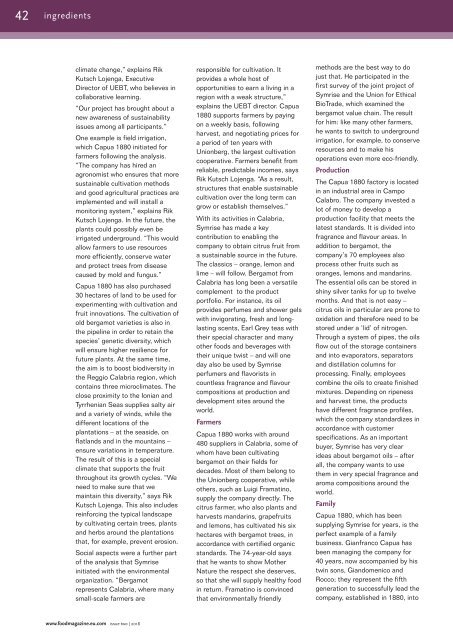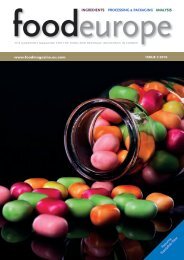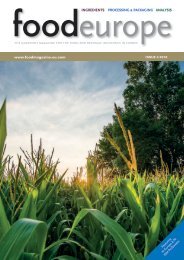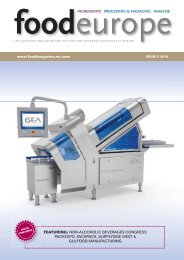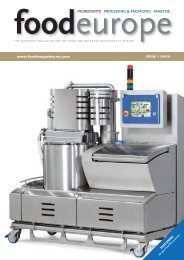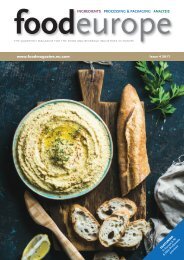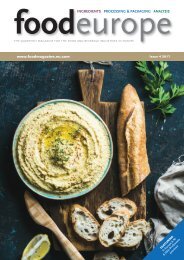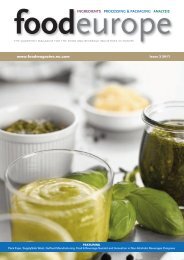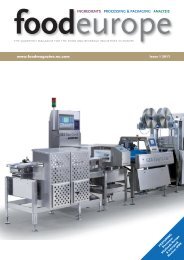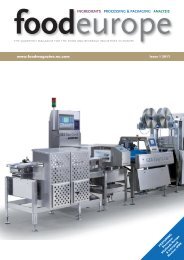Issue 2 2018
Create successful ePaper yourself
Turn your PDF publications into a flip-book with our unique Google optimized e-Paper software.
42<br />
ingredients<br />
climate change,” explains Rik<br />
Kutsch Lojenga, Executive<br />
Director of UEBT, who believes in<br />
collaborative learning.<br />
“Our project has brought about a<br />
new awareness of sustainability<br />
issues among all participants.”<br />
One example is field irrigation,<br />
which Capua 1880 initiated for<br />
farmers following the analysis.<br />
“The company has hired an<br />
agronomist who ensures that more<br />
sustainable cultivation methods<br />
and good agricultural practices are<br />
implemented and will install a<br />
monitoring system,” explains Rik<br />
Kutsch Lojenga. In the future, the<br />
plants could possibly even be<br />
irrigated underground. “This would<br />
allow farmers to use resources<br />
more efficiently, conserve water<br />
and protect trees from disease<br />
caused by mold and fungus.”<br />
Capua 1880 has also purchased<br />
30 hectares of land to be used for<br />
experimenting with cultivation and<br />
fruit innovations. The cultivation of<br />
old bergamot varieties is also in<br />
the pipeline in order to retain the<br />
species’ genetic diversity, which<br />
will ensure higher resilience for<br />
future plants. At the same time,<br />
the aim is to boost biodiversity in<br />
the Reggio Calabria region, which<br />
contains three microclimates. The<br />
close proximity to the Ionian and<br />
Tyrrhenian Seas supplies salty air<br />
and a variety of winds, while the<br />
different locations of the<br />
plantations – at the seaside, on<br />
flatlands and in the mountains –<br />
ensure variations in temperature.<br />
The result of this is a special<br />
climate that supports the fruit<br />
throughout its growth cycles. “We<br />
need to make sure that we<br />
maintain this diversity,” says Rik<br />
Kutsch Lojenga. This also includes<br />
reinforcing the typical landscape<br />
by cultivating certain trees, plants<br />
and herbs around the plantations<br />
that, for example, prevent erosion.<br />
Social aspects were a further part<br />
of the analysis that Symrise<br />
initiated with the environmental<br />
organization. “Bergamot<br />
represents Calabria, where many<br />
small-scale farmers are<br />
responsible for cultivation. It<br />
provides a whole host of<br />
opportunities to earn a living in a<br />
region with a weak structure,”<br />
explains the UEBT director. Capua<br />
1880 supports farmers by paying<br />
on a weekly basis, following<br />
harvest, and negotiating prices for<br />
a period of ten years with<br />
Unionberg, the largest cultivation<br />
cooperative. Farmers benefit from<br />
reliable, predictable incomes, says<br />
Rik Kutsch Lojenga. “As a result,<br />
structures that enable sustainable<br />
cultivation over the long term can<br />
grow or establish themselves.”<br />
With its activities in Calabria,<br />
Symrise has made a key<br />
contribution to enabling the<br />
company to obtain citrus fruit from<br />
a sustainable source in the future.<br />
The classics – orange, lemon and<br />
lime – will follow. Bergamot from<br />
Calabria has long been a versatile<br />
complement to the product<br />
portfolio. For instance, its oil<br />
provides perfumes and shower gels<br />
with invigorating, fresh and longlasting<br />
scents, Earl Grey teas with<br />
their special character and many<br />
other foods and beverages with<br />
their unique twist – and will one<br />
day also be used by Symrise<br />
perfumers and flavorists in<br />
countless fragrance and flavour<br />
compositions at production and<br />
development sites around the<br />
world.<br />
Farmers<br />
Capua 1880 works with around<br />
480 suppliers in Calabria, some of<br />
whom have been cultivating<br />
bergamot on their fields for<br />
decades. Most of them belong to<br />
the Unionberg cooperative, while<br />
others, such as Luigi Framatino,<br />
supply the company directly. The<br />
citrus farmer, who also plants and<br />
harvests mandarins, grapefruits<br />
and lemons, has cultivated his six<br />
hectares with bergamot trees, in<br />
accordance with certified organic<br />
standards. The 74-year-old says<br />
that he wants to show Mother<br />
Nature the respect she deserves,<br />
so that she will supply healthy food<br />
in return. Framatino is convinced<br />
that environmentally friendly<br />
methods are the best way to do<br />
just that. He participated in the<br />
first survey of the joint project of<br />
Symrise and the Union for Ethical<br />
BioTrade, which examined the<br />
bergamot value chain. The result<br />
for him: like many other farmers,<br />
he wants to switch to underground<br />
irrigation, for example, to conserve<br />
resources and to make his<br />
operations even more eco-friendly.<br />
Production<br />
The Capua 1880 factory is located<br />
in an industrial area in Campo<br />
Calabro. The company invested a<br />
lot of money to develop a<br />
production facility that meets the<br />
latest standards. It is divided into<br />
fragrance and flavour areas. In<br />
addition to bergamot, the<br />
company’s 70 employees also<br />
process other fruits such as<br />
oranges, lemons and mandarins.<br />
The essential oils can be stored in<br />
shiny silver tanks for up to twelve<br />
months. And that is not easy –<br />
citrus oils in particular are prone to<br />
oxidation and therefore need to be<br />
stored under a ‘lid’ of nitrogen.<br />
Through a system of pipes, the oils<br />
flow out of the storage containers<br />
and into evaporators, separators<br />
and distillation columns for<br />
processing. Finally, employees<br />
combine the oils to create finished<br />
mixtures. Depending on ripeness<br />
and harvest time, the products<br />
have different fragrance profiles,<br />
which the company standardizes in<br />
accordance with customer<br />
specifications. As an important<br />
buyer, Symrise has very clear<br />
ideas about bergamot oils – after<br />
all, the company wants to use<br />
them in very special fragrance and<br />
aroma compositions around the<br />
world.<br />
Family<br />
Capua 1880, which has been<br />
supplying Symrise for years, is the<br />
perfect example of a family<br />
business. Gianfranco Capua has<br />
been managing the company for<br />
40 years, now accompanied by his<br />
twin sons, Giandomenico and<br />
Rocco; they represent the fifth<br />
generation to successfully lead the<br />
company, established in 1880, into<br />
www.foodmagazine.eu.com issue two | <strong>2018</strong>


